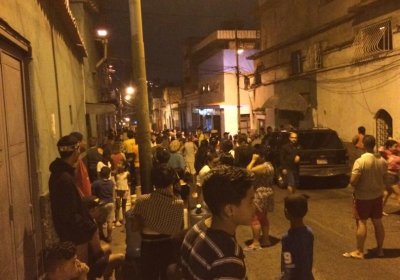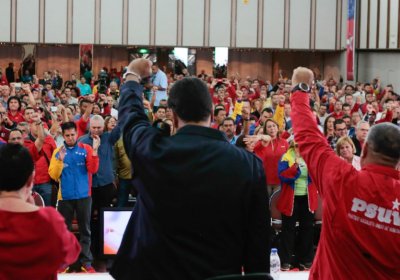The United Socialist Party has landed a comprehensive victory in Venezuela’s regional and local elections, winning 83% of the governorships, reports Paul Dobson.
Paul Dobson
Paul Dobson reports Venezuela has set in motion legal proceedings to have the United States government investigated at the International Criminal Court (ICC).
The Venezuelan government has blamed Colombian President Ivan Duque’s policies for the reignition of armed conflict in the country, writes Paul Dobson.
Three men linked to self-declared “Interim President” Juan Guaido were arrested on July 12, while allegedly selling weapons stolen during the failed April 30 putsch.
The border between Venezuela and Colombia has been partially reopened after nearly four months.
The principal crossing posts of the Simon Bolivar and Francisco de Paula Santander International Bridges — which connect Venezuela’s Tachira State with Colombia’s Northern Santander Department — were reopened on June 8 for pedestrian crossing. They still remain closed for vehicles.
Self-declared Venezuelan Interim President Juan Guaido has ordered the setting up of a meeting with the United States Armed Forces to discuss cooperation in his efforts to oust President Nicolas Maduro, writes Paul Dobson.
Venezuela’s National Constituent Assembly (ANC) has lifted self-declared “interim president” Juan Guaido’s parliamentary immunity, opening the door for criminal charges to be brought against him.
The unanimous April 2 decision came following a request from the Supreme Court of Justice (TSJ) and included an “authorisation” to continue investigations into the parliamentary deputy and president of the National Assembly.
Caracas authorities denied the existence of a humanitarian crisis of Venezuelan migration in the region on August 29, blasting the reaction from neighbouring Latin American governments as “hypocritical” and “xenophobic”.
Venezuelans braced themselves as a series of long-anticipated economic measures came into effect on August 20, including the launch of a new paper currency called the Sovereign Bolivar.
The new currency brings with it a revaluation of all prices, wages and pensions, which will be cut by five zeros. Both the old Strong Bolivar and Sovereign Bolivar will co-exist for a period of time yet to be announced by the government.
Venezuela’s campesino marchers achieved their immediate objective on August 2 by holding a public meeting with President Nicolas Maduro in Caracas that was nationally televised. They presented proposals for far-reaching reforms to state agrarian policies and institutions.
The fourth national congress of Venezuela’s largest political party, the United Socialist Party of Venezuela (PSUV), wound up on July 30 following three days of intense activities. The congress was inaugurated on July 28, on the 64th birthday of the party’s late founder, Hugo Chavez.
The PSUV congress took place in an increasingly complicated context, amidst a collapsing economy, hyperinflation, international financial sanctions and an upcoming monetary reconversion.
Venezuela’s lesbian, gay, bisexual, transgender and intersex (LGBTI) community held their annual pride march in Caracas on July 1.
This year’s march was larger than last year’s event and formed part of continental gay pride activities with large demonstrations held in Colombia, Argentina and Brazil.
- Page 1
- Next page











